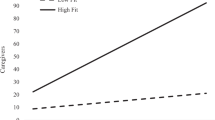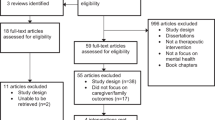Abstract
Peers are an important adjunct to the public mental health service system, and are being increasingly utilized across the country as a cost-effective solution to workforce shortages. Despite the tremendous growth of peer-delivered support over the past two decades, it has only been within the past few years that peer programs have been the subject of empirical inquiry. The purpose of this study was to examine the prevalence and characteristics of peer-delivered parenting programs across the New York State public mental health service system. We surveyed 46 family peer organizations across New York State regarding their delivery of structured peer-delivered parenting programs. Thirty-four (76%) completed the questionnaire, and of them, 18 (53%) delivered a parenting program. Subsequent interviews with seven of the 18 organizations revealed peer organizations had been delivering eight unique parenting programs for upwards of two decades. Additionally, organizations offered multiple supports to families to participate. Training, supervision, and issues around fidelity are discussed, as well as the implications of this study for states utilizing a peer workforce.
Similar content being viewed by others
References
1-2-3 Magic. (n.d.). Retrieved May 9, 2017, from http://www.123magic.com.
Acri, M., Frank, S., Olin, S. S., Burton, G., Ball, J. L., Weaver, J., & Hoagwood, K. E. (2013). Examining the feasibility and acceptability of a screening and outreach model developed for a peer workforce. Journal of Child & Family Studies, 24, 1–10.
Acri, M., Gopalan, G., Chacko, A., & McKay, M. (2017). Engaging families into treatment for child behavior disorders: A synthesis of the literature. In J. Lochman & W. Mathys (Eds.), The Wiley handbook of disruptive and impulse-control disorders. New York: Wiley
Acri, M., Hooley, C. D., Richardson, N., & Moaba, L. B. (2017). Peer models in mental health for caregivers and families. Community Mental Health Journal, 53(2), 241–249. https://doi.org/10.1007/s10597-016-0040-4.
Barkley, R. A. (2002). Psychosocial treatments for attention-deficit/hyperactivity disorder. Journal of Clinical Psychiatry, 63(suppl.), 36–43.
Brister, T., Cavaleri, M. A., Olin, S. S., Shen, S., Burns, B. J., & Hoagwood, K. E. (2012). An evaluation of the NAMI basics program. Journal of Child and Family Studies, 21(3), 439–442.
Burke, L. (1998). Active parenting of teens. Clinical Pediatrics, 37(1), 56–57.
Burke, R., & Barnes, B. (2011). Common sense parenting. Boys Town, NE: Boys Town Press.
Cavaleri, M. A., Olin, S. S., Kim, A., Hoagwood, K. E., & Burns, B. J. (2011). Family support in prevention programs for children at risk for emotional/behavioral problems. Clinical Child and Family Psychology Review, 14(4), 399–412.
Chinman, M., Lucksted, A., Gresen, R., Davis, M., Losonczy, M., Sussner, B., & Martone, L. (2008). Early experiences of employing consumer-providers in the VA. Psychiatric Services, 59(11), 1315–1321.
Chinman, M., Young, A. S., Hassell, J., & Davidson, L. (2006). Toward the implementation of mental health consumer provider services. The Journal of Behavioral Health Services & Research, 33(2), 176.
Chinman, M. J., Rosenheck, R., Lam, J. A., & Davidson, L. (2000). Comparing consumer and nonconsumer provided case management services for homeless persons with serious mental illness. The Journal of nervous and mental disease, 188(7), 446–453.
Citizens’ Committee for Children of New York. New York City’s children and mental health: Prevalence and gap analysis of treatment slot capacity. Retrieved March 23, 2018, from https://www.cccnewyork.org/data-and-reports/publications/new-york-citys-children-and-mental-health-prevalence-and-gap-analysis-of-treatment-slot-capacity/.
Davidson, L., Bellamy, C., Guy, K., & Miller, R. (2012). Peer support among persons with severe mental illnesses: A review of evidence and experience. World Psychiatry, 11(2), 123–128.
Family peer advocates in New York State. Retrieved March 23, 2018, from http://www.ideas4kidsmentalhealth.org/new-york-state-family-peer-advocates.html.
Gopalan, G., Small, L., Fuss, A., Bowman, M., Jackson, J., Marcus, S., & Chacko, A. (2015). Multiple family groups to reduce child disruptive behavior difficulties: Moderating effects of child welfare status on child outcomes. Child Abuse & Neglect, 46, 207–219.
Hoagwood, K. E., Cavaleri, M. A., Olin, S. S., Burns, B. J., Slaton, E., Gruttadaro, D., & Hughes, R. (2010). Family support in children’s mental health: A review and synthesis. Clinical Child and Family Psychology Review, 13(1), 1–45.
Kaufman, L., Brooks, W., Steinley-Bumgarner, M., & Stevens-Manser, S. (2012). Peer specialist training and certification programs: A national overview. Austin, TX: University of Texas at Austin Center for Social Work Research.
Nurturing Parenting. (n.d.). Retrieved May 1, 2017, from http://www.nurturingparenting.com.
Nystul, M. S. (1982). The effects of systematic training for effective parenting on parental attitudes. The Journal of Psychology, 112(1), 63–66.
Parenting Journey. (n.d.). Retrieved May 9, 2017 from http://www.parentingjourney.org.
Parenting the Love and Logic Way. (n.d.). Retrieved May 9, 2017, from http://www.loveandlogic.com.
Pfeiffer, P. N., Heisler, M., Piette, J. D., Rogers, M. A., & Valenstein, M. (2011). Efficacy of peer support interventions for depression: A meta-analysis. General Hospital Psychiatry, 33(1), 29–36.
Pollastri, A. R., Epstein, L. D., Heath, G. H., & Ablon, J. S. (2013). The collaborative problem solving approach: Outcomes across settings. Harvard Review of Psychiatry, 21(4), 188–199.
Popkin, M. H. (1989). The Second handbook on parent education: Contemporary perspectives. Amsterdam: Elsevier.
Small, L. A., Jackson, J., Gopalan, G., & McKay, M. M. (2015). Meeting the complex needs of urban youth and their families through the 4Rs 2Ss Family Strengthening Program: The “real world” meets evidence-informed care. Research on Social Work Practice, 25(4), 433–445.
Solomon, P. (2004). Peer support/peer provided services underlying processes, benefits, and critical ingredients. Psychiatric Rehabilitation Journal, 27(4), 392–401.
Author information
Authors and Affiliations
Corresponding author
Ethics declarations
Conflict of interest
All authors declare that they have no conflicts of interest.
Ethical Approval
According to the New York University Institutional Review Board, no human subjects participated in this study, and thus, this study was exempt from review. Because human subjects did not participate in this study, informed consent was not obtained.
Informed Consent
Because human subjects did not participate in this study, informed consent was not obtained.
Rights and permissions
About this article
Cite this article
Acri, M.C., Craig, N. & Adler, J. An Examination of Peer-Delivered Parenting Skills Programs Across New York State. Community Ment Health J 54, 1163–1171 (2018). https://doi.org/10.1007/s10597-018-0269-1
Received:
Accepted:
Published:
Issue Date:
DOI: https://doi.org/10.1007/s10597-018-0269-1




